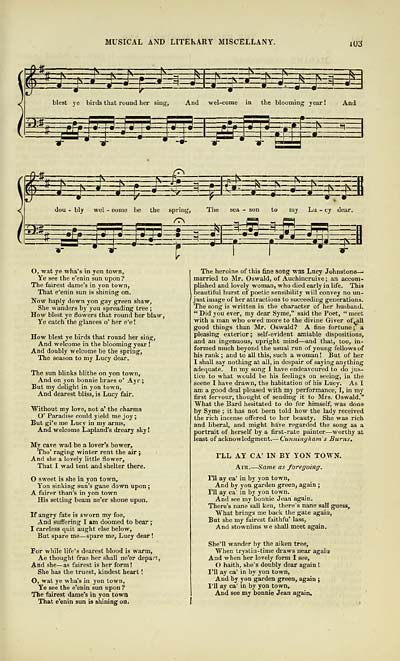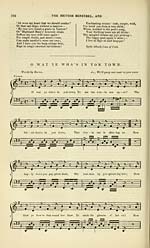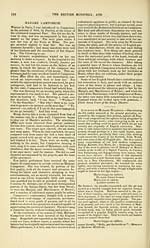Glen Collection of printed music > Printed music > British minstrel, and musical and literary miscellany
(111) Page 103
Download files
Complete book:
Individual page:
Thumbnail gallery: Grid view | List view

MUSICAL AND LITEKARY MISCELLANY.
103
I
*=^
irjs:
j^^E^
:S=ii
ii-r=:^rrg=^
:iS=ii
:i±zi
blest je birds that round her sing, And wel-come in the blooming year 1 And
aii
£3
3
:E
T*-.ir
i
'^
?^=^
i
4f=tc
-^ — ^
15=*:
^
:^:^
:t±::
-^a
Jl=s:
my Lu - cj dear.
31
dou - bly wel - come be the spring-,
The
sea - son
#==iS
^;
f=T
O, wat ye wha's in yon town.
Ye see the e'enin sun upon ?
The fairest dame's in yon town.
That e'enin sun is shining on.
Now haply down yon gay green shaw,
She wanders by yon spreading tree ;
How blest ye flowers that round her blaw.
Ye catch the glances o* her e'e!
How blest ye birds that round her sing,
And welcome in the blooming year I
And doubly welcome be the spring.
The season to my Lucy dear.
The sun blinks blithe on yon town,
And on yon bonnie braes o' Ayr ;
But my delight in yon town.
And dearest bliss, is Lucy fair,
"Without my love, not a' the charms
O' Paradise could yield me joy ;
But gi'e me Lucy in my arms,
And welcome L^land's dreary sky I
My cave wad be a lover's bower,
Tho' raging winter rent the air ;
And she a lovely little flower,
That I wad tent and shelter there.
sweet is she in yon town,
Yon sinking sun's gane down upon ;
A fairer than's in yon town
His setting beam ne'er shone upon.
If angry fate is sworn my foe.
And suflfering I am doomed to bear ;
1 careless quit aught else below,
But spare me — spare me, Lucy dear !
For while life's dearest blood is warm,
Ae thought frae her shall ne'er depart.
And she — as fairest is her form I
She has the truest, kindest heart !
O, wat ye wha's in yon town,
Ye see the e'enin sun upon ?
The fairest dame's in yon town
That e'enin sun is shining on.
The heroine of this fine song was Lucy Johnstone — •
married to Mr. Oswald, of Auchincruive ; an accom-
plished and lovely woman, who died early in life. This
beautiful burst of poetic sensibility will convey no un-
just image of her attractions to succeeding generations.
The song is written in the character of her husband.
" Did you ever, my dear Syme,'* said the Poet, " meet
with a man who owed more to the divine Giver of^l
good things than Mr. Oswald? A fine fortune j** a
pleasing exterior ; self-evident amiable dispositions,
and an ingenuous, upright mind — and that, too, in-
formed much beyond the usual run of young fellows of
his rank ; and to all this, such a woman I But of her
I shall say nothing at all, in despair of saying anything
adequate. In my song I have endeavoured to do jus-
tice to what would be his feelings on seeing, in the
>scene I have drawn, the habitation of his Lucy. As I
am a good deal pleased with my performance, I, in my
first fervour, thought of sending it to Mrs. Oswald. "^
What the Bard hesitated to do for himself, was done
by Syme ; it has not been told how the lady received
the rich incense offered to her beauty. She was rich
and liberal, and might have regarded the song as a
portrait of herself by a first-rate painter — worthy at
least of acknowledgment. — Cunningham's Burns,
I'LL AY CA' IN BY YON TOWN,
Air. — Same as foregoing,
I'll ay ca' in by yon town,
And by yon garden green, again ;
I'll ay ca' in by yon town.
And see my bonnie Jean again.
There's nane sail ken, there's nane sail guess.
What brings me back the gate again,
But she my fairest faithfu' lass.
And stownlins we shall meet again.
She'll wander by the aiken tree.
When trystin-time draws near again
And when her lovely form I see,
O haith, she's doubly dear again I
I'll ay ca' in by yon town.
And by yon garden green, again ;
I'll ay ca' in by yon town.
And see my bonnie Jean again.
103
I
*=^
irjs:
j^^E^
:S=ii
ii-r=:^rrg=^
:iS=ii
:i±zi
blest je birds that round her sing, And wel-come in the blooming year 1 And
aii
£3
3
:E
T*-.ir
i
'^
?^=^
i
4f=tc
-^ — ^
15=*:
^
:^:^
:t±::
-^a
Jl=s:
my Lu - cj dear.
31
dou - bly wel - come be the spring-,
The
sea - son
#==iS
^;
f=T
O, wat ye wha's in yon town.
Ye see the e'enin sun upon ?
The fairest dame's in yon town.
That e'enin sun is shining on.
Now haply down yon gay green shaw,
She wanders by yon spreading tree ;
How blest ye flowers that round her blaw.
Ye catch the glances o* her e'e!
How blest ye birds that round her sing,
And welcome in the blooming year I
And doubly welcome be the spring.
The season to my Lucy dear.
The sun blinks blithe on yon town,
And on yon bonnie braes o' Ayr ;
But my delight in yon town.
And dearest bliss, is Lucy fair,
"Without my love, not a' the charms
O' Paradise could yield me joy ;
But gi'e me Lucy in my arms,
And welcome L^land's dreary sky I
My cave wad be a lover's bower,
Tho' raging winter rent the air ;
And she a lovely little flower,
That I wad tent and shelter there.
sweet is she in yon town,
Yon sinking sun's gane down upon ;
A fairer than's in yon town
His setting beam ne'er shone upon.
If angry fate is sworn my foe.
And suflfering I am doomed to bear ;
1 careless quit aught else below,
But spare me — spare me, Lucy dear !
For while life's dearest blood is warm,
Ae thought frae her shall ne'er depart.
And she — as fairest is her form I
She has the truest, kindest heart !
O, wat ye wha's in yon town,
Ye see the e'enin sun upon ?
The fairest dame's in yon town
That e'enin sun is shining on.
The heroine of this fine song was Lucy Johnstone — •
married to Mr. Oswald, of Auchincruive ; an accom-
plished and lovely woman, who died early in life. This
beautiful burst of poetic sensibility will convey no un-
just image of her attractions to succeeding generations.
The song is written in the character of her husband.
" Did you ever, my dear Syme,'* said the Poet, " meet
with a man who owed more to the divine Giver of^l
good things than Mr. Oswald? A fine fortune j** a
pleasing exterior ; self-evident amiable dispositions,
and an ingenuous, upright mind — and that, too, in-
formed much beyond the usual run of young fellows of
his rank ; and to all this, such a woman I But of her
I shall say nothing at all, in despair of saying anything
adequate. In my song I have endeavoured to do jus-
tice to what would be his feelings on seeing, in the
>scene I have drawn, the habitation of his Lucy. As I
am a good deal pleased with my performance, I, in my
first fervour, thought of sending it to Mrs. Oswald. "^
What the Bard hesitated to do for himself, was done
by Syme ; it has not been told how the lady received
the rich incense offered to her beauty. She was rich
and liberal, and might have regarded the song as a
portrait of herself by a first-rate painter — worthy at
least of acknowledgment. — Cunningham's Burns,
I'LL AY CA' IN BY YON TOWN,
Air. — Same as foregoing,
I'll ay ca' in by yon town,
And by yon garden green, again ;
I'll ay ca' in by yon town.
And see my bonnie Jean again.
There's nane sail ken, there's nane sail guess.
What brings me back the gate again,
But she my fairest faithfu' lass.
And stownlins we shall meet again.
She'll wander by the aiken tree.
When trystin-time draws near again
And when her lovely form I see,
O haith, she's doubly dear again I
I'll ay ca' in by yon town.
And by yon garden green, again ;
I'll ay ca' in by yon town.
And see my bonnie Jean again.
Set display mode to: Large image | Transcription
Images and transcriptions on this page, including medium image downloads, may be used under the Creative Commons Attribution 4.0 International Licence unless otherwise stated. ![]()
| Special collections of printed music > Glen Collection of printed music > Printed music > British minstrel, and musical and literary miscellany > (111) Page 103 |
|---|
| Permanent URL | https://digital.nls.uk/91436277 |
|---|
| Description | Scottish songs and music of the 18th and early 19th centuries, including music for the Highland bagpipe. These are selected items from the collection of John Glen (1833 to 1904). Also includes a few manuscripts, some treatises, and other books on the subject. |
|---|
| Description | The Glen Collection and the Inglis Collection represent mainly 18th and 19th century Scottish music, including Scottish songs. The collections of Berlioz and Verdi collected by bibliographer Cecil Hopkinson contain contemporary and later editions of the works of the two composers Berlioz and Verdi. |
|---|

